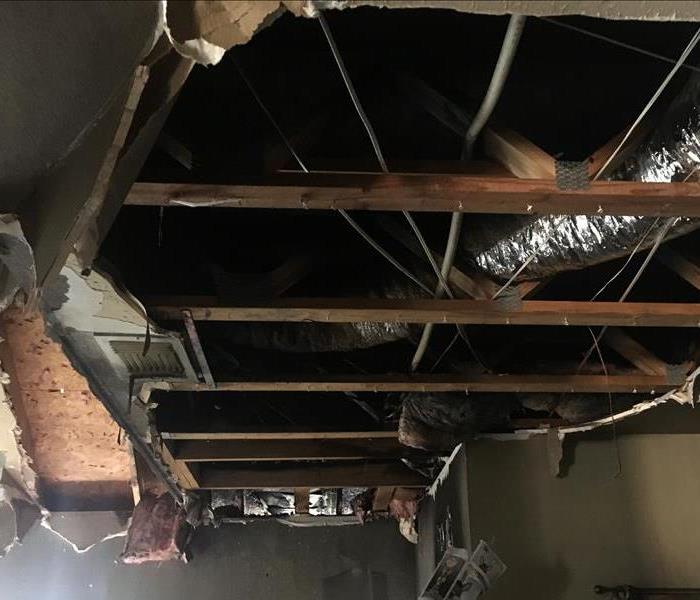Mold in Commercial Kitchens: Expert Insights on Risks and Solutions from SERVPRO®
11/13/2024 (Permalink)
 We dive into the key risks of mold growth in commercial kitchens and provide expert solutions to help you keep your kitchen clean and mold-free.
We dive into the key risks of mold growth in commercial kitchens and provide expert solutions to help you keep your kitchen clean and mold-free.
Mold in commercial kitchens in San Antonio, TX, is not only an inconvenience, but it also poses serious risks to the business's reputation and operational efficiency. Kitchens, especially commercial ones, often have the ideal conditions for mold to thrive: moisture, warmth, and food residues. To prevent disruptions and potential long-term damage, understanding the risks of mold in a commercial kitchen and learning how to prevent it is crucial.
In this blog, we’ll dive into the key risks of mold growth in commercial kitchens and provide expert solutions to help you keep your kitchen clean, safe, and mold-free.
The Prevalence of Mold in Commercial Kitchens
Mold can develop quickly in environments where moisture is abundant, and kitchens are particularly vulnerable due to regular water use, humidity, and food waste. According to a report from the International Association for Food Protection (IAFP), over 25% of food service establishments experience mold growth at some point. This statistic highlights the importance of mold prevention in commercial kitchens.
Risks of Mold in Commercial Kitchens
While mold in a commercial kitchen might seem like just a cleanliness issue, it can lead to serious risks that impact the business in multiple ways:
1. Damage to Equipment and Infrastructure
Mold can cause significant damage to kitchen equipment, ceilings, walls, and flooring. It grows in moist areas, so places like sink areas, under refrigeration units, and behind walls where pipes run are at higher risk. Over time, mold can deteriorate structural materials, requiring costly repairs or replacements.
2. Contamination of Food Supplies
One of the biggest risks of mold in a commercial kitchen is the potential for food contamination. Mold spores can easily spread through the air, and if they land on food preparation areas or equipment, there is a heightened risk of cross-contamination. This can result in wasted inventory, increased costs, and operational downtime.
3. Increased Operational Costs
Addressing mold once it has spread can lead to increased operational costs. The cleanup process can be time-consuming, require specialized equipment, and, in some cases, lead to the temporary closure of the kitchen. Regular mold inspections and prevention measures can help reduce these unexpected costs.
Expert Solutions for Mold Prevention in Commercial Kitchens
Preventing mold in commercial kitchens requires a combination of proactive maintenance, routine cleaning, and proper ventilation. Here are some expert solutions for keeping your kitchen mold-free:
1. Control Humidity Levels
High humidity is one of the main factors that contribute to mold growth. To combat this, install dehumidifiers or ensure proper ventilation, especially in areas where moisture tends to accumulate, such as near dishwashing stations or under refrigeration units. Keeping humidity levels below 60% is ideal for preventing mold growth.
2. Fix Leaks Immediately
Even small leaks can create the perfect environment for mold to thrive. Regularly inspect plumbing under sinks, around water fixtures, and near refrigeration units for signs of leaks. Addressing leaks as soon as they are detected will help prevent moisture from spreading to hidden areas.
3. Clean Hard-to-Reach Areas Regularly
Certain areas in commercial kitchens are more prone to mold growth due to limited access during routine cleaning. Areas behind equipment, under sinks, and ventilation ducts are some of the most common places where mold can grow unnoticed. Schedule deep cleaning sessions to ensure these areas are cleaned and inspected regularly.
4. Use Mold-Resistant Materials
When building or renovating a commercial kitchen, consider using mold-resistant materials, such as moisture-resistant drywall, mold-inhibiting paint, or stainless steel surfaces. These materials not only prevent mold growth but also make routine cleaning easier and more effective.
5. Implement a Regular Inspection Schedule
Regular inspections by professional mold remediation experts like SERVPRO® can help detect and address mold problems early. Inspections should focus on high-moisture areas, including under refrigeration units, ventilation systems, and food prep surfaces.
6. Install Proper Ventilation Systems
A properly designed ventilation system can drastically reduce the risk of mold by removing excess moisture from the air. Ensure that your kitchen's exhaust systems are functioning optimally, and consider adding extra vents in areas that experience higher humidity levels.
Best Practices for Long-Term Mold Prevention
In addition to addressing mold risks, there are a few best practices that can help ensure long-term mold prevention in commercial kitchens:
- Keep Floors Dry: Standing water on kitchen floors is a major mold hazard. Train staff to promptly mop up spills and avoid leaving wet floors unattended.
- Clean Drains and Grease Traps: Regularly clean drains and grease traps to prevent the buildup of organic material that can contribute to mold growth.
- Store Food Properly: Ensure that food items are stored correctly in airtight containers and kept at the appropriate temperature to avoid moisture buildup that can encourage mold.
Why Choose SERVPRO for Mold Remediation?
When mold is already present in your commercial kitchen, professional remediation is essential. SERVPRO provides expert mold removal and remediation services, ensuring that your kitchen is restored to a safe and operational state. Our team of highly trained professionals uses advanced technology and techniques to remove mold, address underlying moisture issues, and ensure that your kitchen stays mold-free.
Conclusion
Mold in commercial kitchens poses several risks, from equipment damage to food contamination. By implementing expert mold prevention strategies, such as controlling humidity levels, fixing leaks, and ensuring proper ventilation, you can significantly reduce the likelihood of mold growth. Should you need professional mold remediation, SERVPRO is Here to Help® keep your kitchen safe, operational, and mold-free.
Don't let mold impact your commercial kitchen. Contact SERVPRO for expert mold prevention and remediation services today!






 24/7 Emergency Service
24/7 Emergency Service